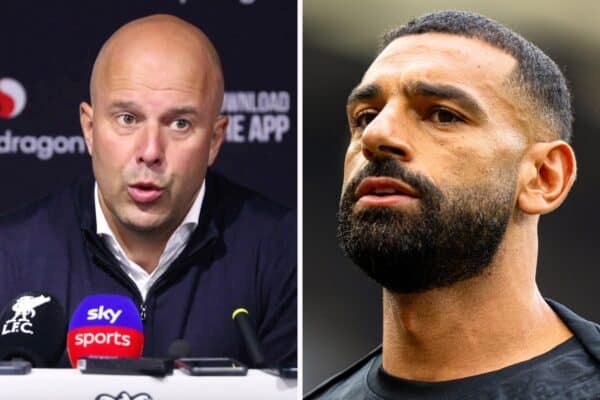Arne Slot admits Mohamed Salah is ‘out of form’ – and explains why

The air around Anfield is never quiet. Every week, every game, every performance brings a new storm of debates, headlines, and emotions. And when the storm involves Mohamed Salah, the king of the Kop, the story spreads like wildfire across Liverpool and far beyond. This week, it was not a late winning goal, not a dazzling assist, and not one of his trademark curled finishes into the top corner. Instead, it was Liverpool’s head coach Arne Slot who stood before reporters and admitted something that fans had quietly begun to whisper: Salah, by his high standards, is out of form.
The words sent shockwaves across the football world. How could Salah, the Egyptian forward who has been Liverpool’s talisman for nearly a decade, be spoken of in this way? A man who just last season delivered 34 goals and 23 assists across all competitions now being described as “out of form”? For some, it felt like an insult to a legend. For others, it was simply the truth. And in his calm Dutch manner, Slot did not throw Salah under the bus but instead tried to explain a much bigger story—the story of how Liverpool are changing, how opponents are adapting, and how the challenges of modern football are reshaping even the greats.
The numbers tell part of the story. Salah has three goals and three assists in nine appearances so far this season. For an ordinary winger, those would be impressive statistics. But Salah has never been ordinary. He has lived in a world of extraordinary numbers, where 30+ goals became routine, where assists came in floods, and where defenders trembled every time he cut inside onto his left foot. Compared to that, three goals in nine games looks quiet. Compared to last season’s breathtaking 34 goals, it looks almost worrying.
And when you stretch the numbers further, the picture becomes clearer. Salah has scored only five goals in his last 20 matches, going back to March. For a man who built his career on relentless consistency, that is a dip. The aura of inevitability that once surrounded him—when fans would almost expect a goal every time he touched the ball—has faded a little.
But football is never simple. Slot explained that this was not just about Salah himself. He pointed back to the second half of last season, when Salah scored 12 goals, but six of those came from penalties and set pieces. Only six were from open play. The coach then painted a bigger picture: opponents have changed. The way teams play against Liverpool now is different.
He used Manchester United as an example. In an away game last season, United tried to play out from the back. Liverpool pressed high, won the ball, and punished them. Salah thrived in that chaos. But when United came to Anfield, they changed. Goalkeeper André Onana no longer took risks—he went long almost every time. That meant fewer pressing opportunities, fewer turnovers high up the pitch, and fewer chances for Salah to do what he does best.
This, Slot said, is the story of Liverpool today. They are no longer the underdogs. No longer the chaotic, unpredictable side that could catch bigger clubs by surprise. They are now the champions, the team to beat, the side everyone studies carefully. Opponents adapt. Defenders sit deeper, goalkeepers play safer, and space becomes tighter. Salah, once able to run free behind backlines, now faces two, sometimes three players marking him out of the game.
The problem, Slot continued, is not just Salah. It is team-wide. Liverpool are scoring fewer open-play goals than before. This is the great irony of success: the higher you rise, the harder the battles become.
But Slot also knows that part of the challenge is self-inflicted. He has changed Liverpool’s system. Under Jürgen Klopp, Liverpool were built on the 4-3-3, a formation that allowed Salah to thrive in wide areas, cutting inside while full-backs bombed forward. Now, under Slot, Liverpool are moving closer to a 4-2-3-1, with a traditional No. 10, Florian Wirtz, at the centre of creativity. The change has its benefits—it makes Liverpool less predictable, more flexible—but it also requires adaptation. And during adaptation, even great players can look less sharp.
Salah is caught in this moment of change. No longer the absolute focal point of Liverpool’s attacks, he must share the spotlight with new stars like Wirtz, Cody Gakpo, and Alexander Isak. That does not mean he is finished. Far from it. Slot made clear that Salah will benefit in the long run. Once the team settles into the system, once chemistry flows more naturally, the Egyptian King will rise again.
Still, fans are restless. Anfield is a place where legends are made, but it is also a place where expectations weigh heavy. Salah has set standards so high that even a small dip feels like disaster. For some supporters, Slot’s admission was refreshing honesty. For others, it was a risk—why admit your star is struggling when confidence is already fragile?
On social media, the debates exploded. Some fans pointed out that Salah’s work rate, his leadership, and his ability to drag defenders still create space for others, even if his goals are fewer. Others argued that at 33 years old, time is beginning to catch up with him. Every great player, they say, eventually reaches a point where the numbers decline. Is Salah reaching that point now? Or is this just a temporary pause before another explosion of goals?
Inside the dressing room, the mood is different. Players know what Salah brings beyond statistics. They see his professionalism, his fitness, his hunger to train harder than anyone else. They also see the way opponents treat him—with fear, with double-teams, with plans built just to stop him. That respect alone shows he remains a force.
Slot himself is not panicking. He explained that the struggles with open-play goals are something they work on “very hard” in training. He believes the more this group plays together, the smoother it will become. And when the system clicks, Salah will be at the heart of it.
Yet, in football, patience is rare. Every missed chance, every quiet performance becomes a headline. For Salah, this is nothing new. He has faced doubters before. When he first arrived at Liverpool in 2017, some said he was not good enough. He answered with 44 goals in his debut season. When people questioned his consistency, he answered by scoring 20+ goals for seven consecutive seasons. Now, as people question his form again, history suggests he will answer the same way—on the pitch, with goals.
But what if this time is different? What if the system change, the age factor, and the evolution of opponents combine to reduce his output permanently? Liverpool fans dare not imagine a future without Salah at his peak. He is not just a player—he is an icon. His image covers walls, his name is sung in every match, and his story, from Egypt to Anfield, has inspired millions. To see him fade would hurt deeply.
For now, Slot has thrown down the challenge. The coach’s words were not an attack but a reality check. He made it clear that this is a team problem, not just a Salah problem. He reminded everyone that the Egyptian has been in this position before, in the second half of last season, and still found ways to score. He emphasised that the system is being built for the future, not just the present.
And maybe that is the key lesson here: transitions are always messy. Klopp’s era was glorious, but to build something new, Slot must sometimes take risks, sometimes make changes that hurt in the short term but pay off later. Salah, the king of the old era, is still central to this new chapter, but even kings must adapt.
The coming months will tell the story. If Salah bursts back into form, this moment will be remembered as just a blip, a small storm in a long reign. If he continues to struggle, the whispers will grow louder. And Liverpool, as always, will stand at the centre of the football world’s gaze.
For now, the image of Salah sitting on the bench in Istanbul, waiting to come on during the Champions League clash against Galatasaray, says it all. A legend in transition. A king searching for his crown again. A reminder that even the greatest must sometimes walk through valleys before they climb the mountain again.
And through it all, Anfield waits. The fans wait. Because they know one thing—when Salah rises, when he finds that magic again, the roar of the Kop will be louder than ever.















